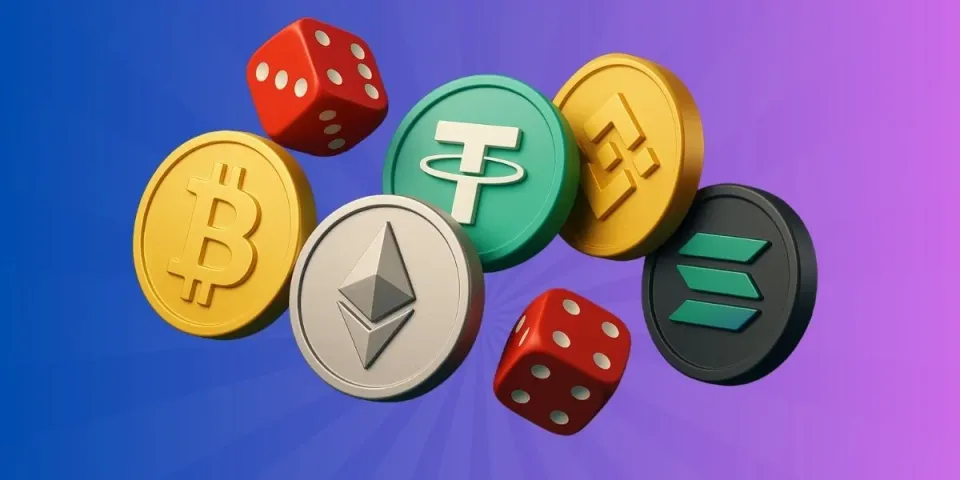Rolling the Dice with Crypto? Here’s Why Stablecoins Are Winning in Online Casinos

Stablecoins are reshaping online payments, and with growing adoption and clearer regulations, they’re emerging as a popular option in iGaming as well. Today, stablecoins such as Tether's USDT are commonly lined up together with Bitcoin and Dogecoin in a casino's list of standard payment options. Interestingly, an increasing number of players are using these tokens to bet on sports and play their favorite casino games.
The use of crypto for online gambling isn't new. Casinos were early adopters of Bitcoin and other cryptocurrencies as payment methods. The first reported use of Bitcoin and crypto was in 2012, with SatoshiDice as one of the early betting sites to accept the payment. SatoshiDice was the pioneer in letting its players use BTC to bet on casino games, and this was followed by other online gambling sites as the blockchain technology matured.
Soon, other popular gambling sites followed, including BitStarz, blending crypto with fiat payment options.
Even physical casinos were early in the game, allowing their players and clients to deposit and bet using Bitcoin and crypto. According to Gore (2023) of the University of Nevada, the Merit Hotel in the Turkish Republic of Northern Cyprus hosted the first casino that allowed payments using Bitcoin.
And as the technology matured, other hotels and casinos in Las Vegas also accepted crypto payments. And while Bitcoin was the first to be accepted, stablecoins like Tether's USDT have become reliable payment methods for many.

Popular reasons casinos and players prefer stablecoins
Bitcoin may be the premier digital asset, but stablecoins are becoming more popular among operators and players. Let's look at the top reasons why many BTC casinos and new betting sites prefer stablecoins.
Price stability. A key characteristic of stablecoins is their inherent price stability. For example, USDT's market value is pegged 1:1 to the US dollar, meaning the crypto's value remains stable even as other cryptos like BTC, DOGE, and XRP fluctuate wildly.
Since the stablecoins' value remains the same, players will not be surprised and stressed by unexpected changes in account balances and winnings. Just imagine if you're playing with Bitcoin, and here's a massive price correction—your $100 worth of BTC winnings can come $50 or lower, overnight!
So, for casino players who want to protect their winnings, or at least enjoy some predictability in their account balances, they may want to play with stablecoins.
Fast and low-cost transactions. Stablecoins are preferred by many thanks to faster transaction times and low-cost transfers. While e-wallets take hours, and bank transfers take 2 to 5 business days to complete, crypto payments instantly credited to your account. You can even find Bitcoin-first betting sites that offer instant deposits and payouts, allowing you to instantly enjoy your winnings.
Also, transaction costs are kept to a minimum if you're using crypto. For example, payouts with stablecoins (USDT.USDC) on Tron (TRC 20) usually costs a few cents, making them popular online.
Or if you're using BUSD/USDT on the Binance Smart Chain (BEP 20), the fee typically range from $0.10 to $0.50. So, it isn't surprising to find many crypto casinos prioritizing Tron (TRC-20) and BSC (BEP-20) transactions because they keep fees low.
Ease in tracking and bankroll management. Stablecoins make it easier for operators and players to keep track of the bets, account balances, and winnings in USD. There's no need to constantly check the current exchange rate, or complete conversions, making it easier for players to budget their bankroll,and casinos to run their payout schedules.
Global accessibility. Stablecoins are widely recognized and accepted, making it a cost-effective payment solution for operators. Tether's USDT is a reliable payment method for online payments, and can be used for casino deposits too. Stablecoins allow seamless cross-border casino payments even in regions where fiat payment options are limited (or expensive), or with strict banking controls.
More regulatory clarity. Stablecoins are charging to mainstream adoption thanks to the passage of new regulatory frameworks in the EU, the UK, and US. The most recent (and arguably the most important) is the GENIUS Act of 2025 or the Guiding and Establishing National Innovation for U.S. Stablecoins which establishes a federal regulatory framework for these tokens. The Act specifies plenty of guardrails to protect consumers, and promote a safe stablecoins industry for all.
The GENIUS Act officially mandates the 1:1 backing with the US dollar or any other liquid assets, publication of transparency reports, licenses for issuers, and the need to implement AML/KYC compliance. New regulations make using stablecoins for online payments, including casino deposits, safer.
Risks and key challenges of using stablecoins for iGaming
So, should you rush into signing up for an account with a crypto casino and use stablecoins for payments? Not so fast. Like investing in Bitcoin and other digital assets, using stablecoins for online gaming is also fraught with risks and challenges.
- Regulatory issues. Although there's an increasing number of policies and frameworks that clarify the use of stablecoins, many still see its use with caution. Operators still face compliance issues, like fines and strict licensing requirements, if regulations tighten.
- Fraud and AML concerns. Stablecoins make it easier to move large amounts of money and privately, raising suspicions of fraud and money laundering. Online casino operators need robust KYC/AML program to track players' transactions.
- Custody risks. Some of the popular stablecoins are issued by centralized companies. If these issuers face legal or operational troubles, then it can also impact the holders.
- Market price volatility. Players using stablecoins for payments face price volatility. While these popular stablecoins are pegged to fiat, at 1:1 rate, "depegging" events like the UST collapse in 2022 show that they're not completely risk-free.
- Drop in confidence, adoption falls. USDT's issuer, Tether, has been the subject of long-standing criticisms over its reserve transparency. For years, it claimed that every USDT was backed by 1:1 by US dollar with no audit, leading to loss of trust. In 2021, it fined $41 million for its 'misleading statements', but has now improved its reporting, leading to increased confidence in its operations.
The market's experience with Tether shows the importance of confidence—if trust wavers, adoption suffers. While questions on transparency and legitimacy continue to impact stablecoins, we can't deny that it's the better option when it comes to online gambling payments.
Stablecoins like Tether's USDT and USDC are better because they combine the efficiency, speed, and privacy of crypto, with fiat's predictability. All these elements make stablecoins a recommended option for iGaming, where convenience, stability, and compliance are becoming more important.




